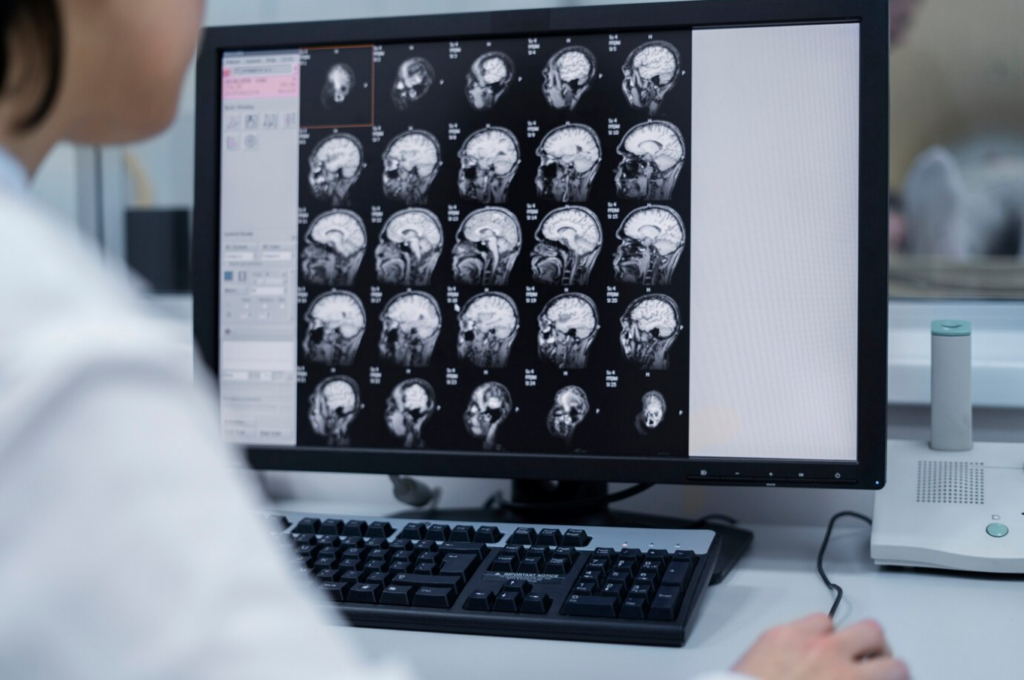A team of researchers from the Vall d’Hebron Institute of Oncology (VHIO), IDIBELL and the University Hospital of Bellvitge, have developed the DISCERN tool based on pattern learning using artificial intelligence models from the information provided by standard magnetic resonance imaging. DISCERN outperforms conventional methods to help diagnose brain tumours. The results of this study have been published in the scientific journal Cell Reports Medicine.
Differential diagnosis of brain tumours
Seventy percent of malignant brain tumours are of one of three types: glioblastoma multiforme, brain metastases from solid tumours and primary nervous system lymphoma. Each of them requires a different therapeutic approach and it is therefore essential to diagnose them correctly and unequivocally.
“The non-invasive differential diagnosis of brain tumours is currently based on magnetic resonance imaging evaluation before and after contrast administration. However, a definitive diagnosis often requires neurosurgical interventions that compromise patients’ quality of life,” explains Dr. Raquel Pérez-López, head of VHIO’s Radiomics Group and senior investigator of the study.
“This work is the result of more than five years of research in which we have identified innovative magnetic resonance perfusion imaging biomarkers useful in the differential diagnosis of brain tumours. In this culminating project, the knowledge of several previous works is integrated with artificial intelligence methods, resulting in a software that automates the pre-surgical diagnostic classification with very good accuracy, while facilitating its clinical applicability with a friendly interface for clinicians” says Dr. Albert Pons-Escoda, IDIBELL researcher and clinical neuroradiologist at the Neuroradiology Unit of the Hospital Universitari de Bellvitge, and co-author of the study.
Experts in Neuroimaging IDIBELL and HUB, with clinical and research experience in the development of methods for the classification of brain tumours, have collaborated closely with the Radiomics Group of the Vall d’Hebron Institute of Oncology (VHIO) in the development of this tool based on deep learning, a method of artificial intelligence. This tool takes advantage of all the spatial and temporal information from standard MRI scans to identify specific behavioural patterns in the image of each tumour.
“Deep learning consists of teaching the machine the characteristics of each of the tumours found in the MRI scans of already diagnosed patients,” explains Alonso García-Ruiz, predoctoral researcher in VHIO’s Radiomics Group and first author of this study. “For example, if we show the computer thousands of images of dogs and cats, it will learn the characteristics that define and distinguish dogs from cats, and when it sees a new image it will be able to differentiate whether it is one or the other”.
In this case, the learning units are voxels, the smallest unit of volume that we can study in magnetic resonance imaging. It is the equivalent of a pixel, but in 3D.
“DISCERN has learned the characteristics of these three different types of brain tumour from 50,000 voxels of 40 diagnosed patients,” explains Dr Raquel Pérez-López. “We validated the tool in more than 500 additional cases and found that 78% of the diagnoses given by the tool were correct, a higher proportion than that obtained with the conventional methods used until now“.
“This is a diagnostic support tool that provides useful information to guide medical decisions of multidisciplinary groups regarding the need and type of surgery required to confirm the diagnosis” says Dr. Carles Majós, IDIBELL researcher and clinical neuroradiologist at the Neuroradiology Unit of the HUB, and co-author of the study.
The VHIO Radiomics Group, in close collaboration with IDIBELL and HUB teams, has developed an open access software Diagnosis in Susceptibility Contrast Enhancing Regions for Neuroncology (DISCERN) so that the tool can be used in any centre and further refine the diagnostic system.
In this study have collaborated the research group in Neuro-oncology of IDIBELL (Barcelona), the Radiology Services of the Hospital Universitari Bellvitge, Hospital Clínic de Barcelona and the Department of Radiology of HT Medica (Andalusia), the Department of Radiological Medicine and Applied Sciences and the Department of Bioengineering at the University of California (La Jolla, San Diego).
This work has been carried out thanks to the support of the CRIS Against Cancer Foundation, the FERO Foundation and the “la Caixa” Foundation, which fund the research of the VHIO Radiomics Group through various initiatives.
The Bellvitge Biomedical Research Institute (IDIBELL) is a biomedical research center created in 2004. It is participated by the Bellvitge University Hospital and the Viladecans Hospital of the Catalan Institute of Health, the Catalan Institute of Oncology, the University of Barcelona and the City Council of L’Hospitalet de Llobregat.
IDIBELL is a member of the Campus of International Excellence of the University of Barcelona HUBc and is part of the CERCA institution of the Generalitat de Catalunya. In 2009 it became one of the first five Spanish research centers accredited as a health research institute by the Carlos III Health Institute. In addition, it is part of the “HR Excellence in Research” program of the European Union and is a member of EATRIS and REGIC. Since 2018, IDIBELL has been an Accredited Center of the AECC Scientific Foundation (FCAECC).

